Understanding Australian Society & Culture
VerifiedAdded on 2020/03/16
|5
|1501
|171
AI Summary
This assignment examines various aspects of Australian society and culture. It prompts reflection on the importance of building relationships to foster acceptance of cultural diversity. The history of the 'White Australia Policy' is analyzed, highlighting its abolishment in 1966 and its lasting impact. Personal experiences with racism are shared, illustrating the continued challenges faced by individuals from diverse backgrounds.
Contribute Materials
Your contribution can guide someone’s learning journey. Share your
documents today.
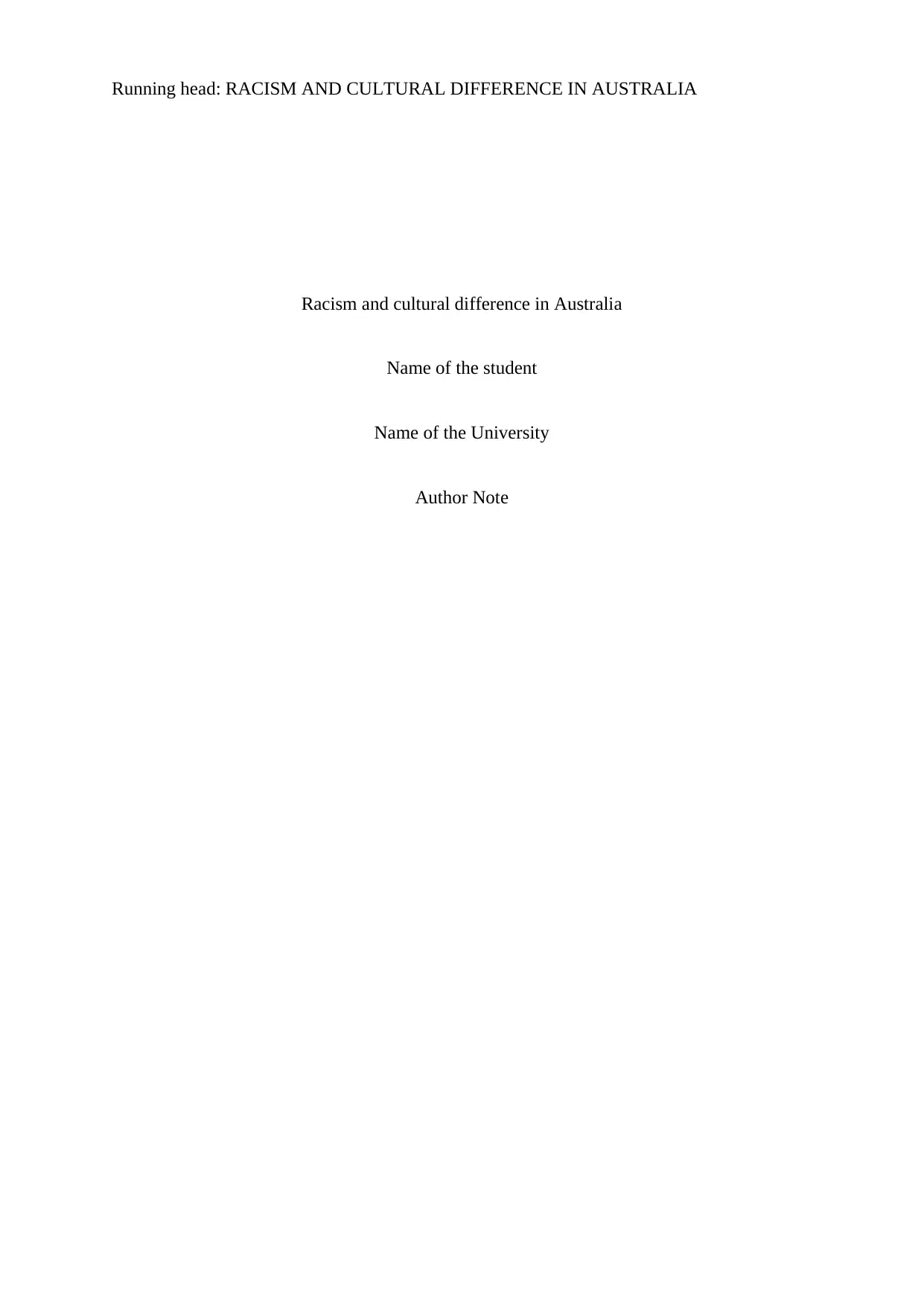
Running head: RACISM AND CULTURAL DIFFERENCE IN AUSTRALIA
Racism and cultural difference in Australia
Name of the student
Name of the University
Author Note
Racism and cultural difference in Australia
Name of the student
Name of the University
Author Note
Secure Best Marks with AI Grader
Need help grading? Try our AI Grader for instant feedback on your assignments.
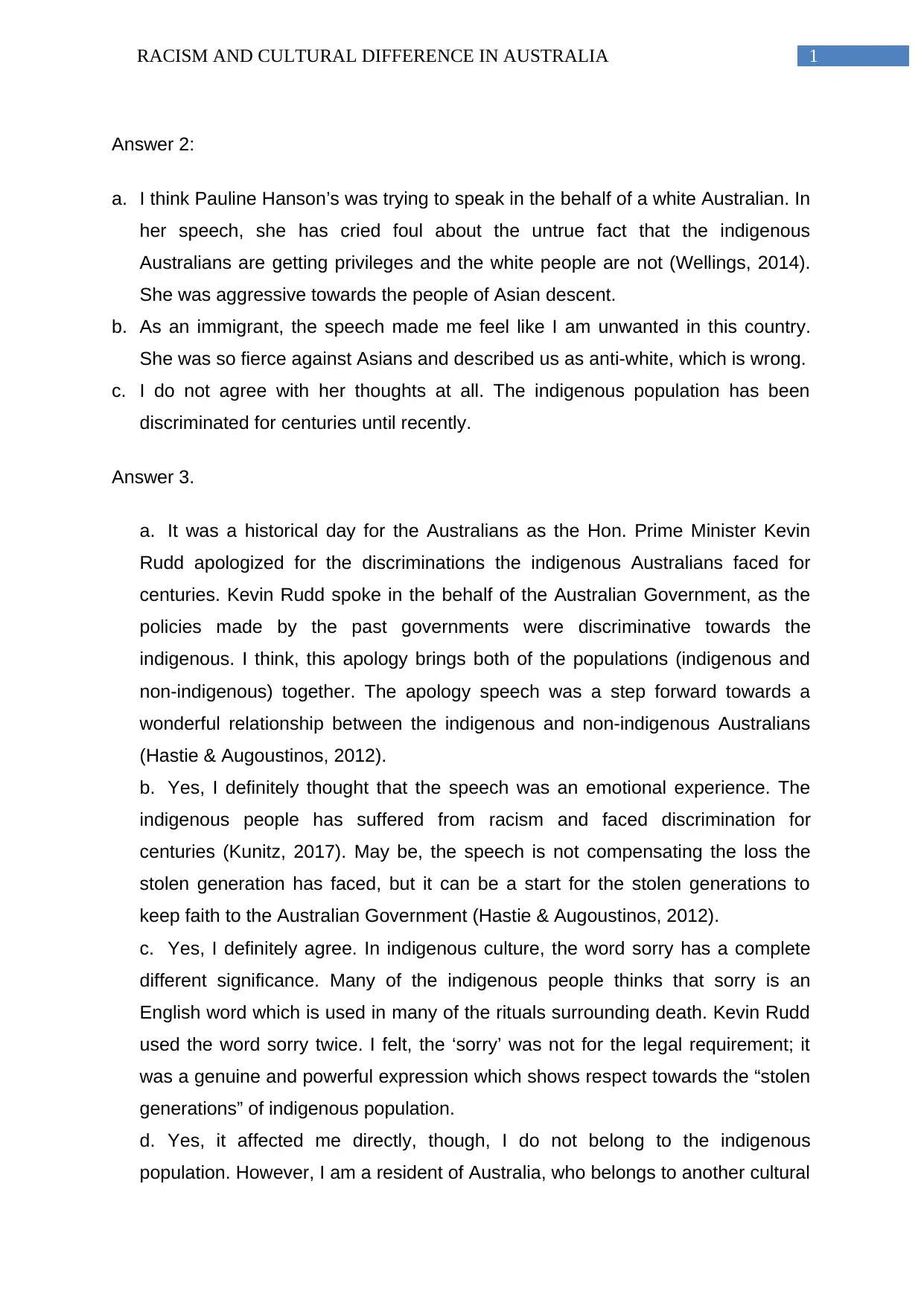
1RACISM AND CULTURAL DIFFERENCE IN AUSTRALIA
Answer 2:
a. I think Pauline Hanson’s was trying to speak in the behalf of a white Australian. In
her speech, she has cried foul about the untrue fact that the indigenous
Australians are getting privileges and the white people are not (Wellings, 2014).
She was aggressive towards the people of Asian descent.
b. As an immigrant, the speech made me feel like I am unwanted in this country.
She was so fierce against Asians and described us as anti-white, which is wrong.
c. I do not agree with her thoughts at all. The indigenous population has been
discriminated for centuries until recently.
Answer 3.
a. It was a historical day for the Australians as the Hon. Prime Minister Kevin
Rudd apologized for the discriminations the indigenous Australians faced for
centuries. Kevin Rudd spoke in the behalf of the Australian Government, as the
policies made by the past governments were discriminative towards the
indigenous. I think, this apology brings both of the populations (indigenous and
non-indigenous) together. The apology speech was a step forward towards a
wonderful relationship between the indigenous and non-indigenous Australians
(Hastie & Augoustinos, 2012).
b. Yes, I definitely thought that the speech was an emotional experience. The
indigenous people has suffered from racism and faced discrimination for
centuries (Kunitz, 2017). May be, the speech is not compensating the loss the
stolen generation has faced, but it can be a start for the stolen generations to
keep faith to the Australian Government (Hastie & Augoustinos, 2012).
c. Yes, I definitely agree. In indigenous culture, the word sorry has a complete
different significance. Many of the indigenous people thinks that sorry is an
English word which is used in many of the rituals surrounding death. Kevin Rudd
used the word sorry twice. I felt, the ‘sorry’ was not for the legal requirement; it
was a genuine and powerful expression which shows respect towards the “stolen
generations” of indigenous population.
d. Yes, it affected me directly, though, I do not belong to the indigenous
population. However, I am a resident of Australia, who belongs to another cultural
Answer 2:
a. I think Pauline Hanson’s was trying to speak in the behalf of a white Australian. In
her speech, she has cried foul about the untrue fact that the indigenous
Australians are getting privileges and the white people are not (Wellings, 2014).
She was aggressive towards the people of Asian descent.
b. As an immigrant, the speech made me feel like I am unwanted in this country.
She was so fierce against Asians and described us as anti-white, which is wrong.
c. I do not agree with her thoughts at all. The indigenous population has been
discriminated for centuries until recently.
Answer 3.
a. It was a historical day for the Australians as the Hon. Prime Minister Kevin
Rudd apologized for the discriminations the indigenous Australians faced for
centuries. Kevin Rudd spoke in the behalf of the Australian Government, as the
policies made by the past governments were discriminative towards the
indigenous. I think, this apology brings both of the populations (indigenous and
non-indigenous) together. The apology speech was a step forward towards a
wonderful relationship between the indigenous and non-indigenous Australians
(Hastie & Augoustinos, 2012).
b. Yes, I definitely thought that the speech was an emotional experience. The
indigenous people has suffered from racism and faced discrimination for
centuries (Kunitz, 2017). May be, the speech is not compensating the loss the
stolen generation has faced, but it can be a start for the stolen generations to
keep faith to the Australian Government (Hastie & Augoustinos, 2012).
c. Yes, I definitely agree. In indigenous culture, the word sorry has a complete
different significance. Many of the indigenous people thinks that sorry is an
English word which is used in many of the rituals surrounding death. Kevin Rudd
used the word sorry twice. I felt, the ‘sorry’ was not for the legal requirement; it
was a genuine and powerful expression which shows respect towards the “stolen
generations” of indigenous population.
d. Yes, it affected me directly, though, I do not belong to the indigenous
population. However, I am a resident of Australia, who belongs to another cultural
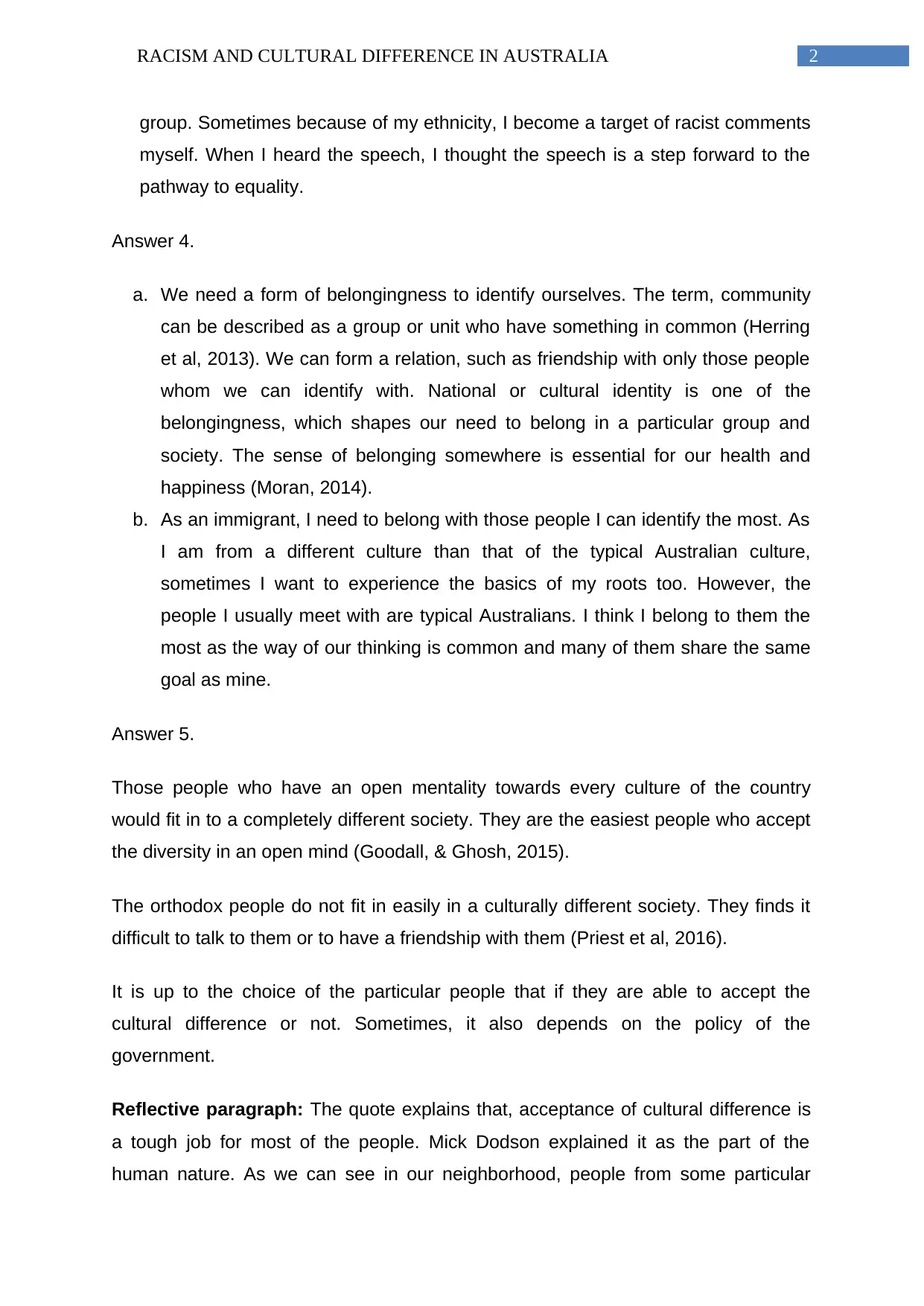
2RACISM AND CULTURAL DIFFERENCE IN AUSTRALIA
group. Sometimes because of my ethnicity, I become a target of racist comments
myself. When I heard the speech, I thought the speech is a step forward to the
pathway to equality.
Answer 4.
a. We need a form of belongingness to identify ourselves. The term, community
can be described as a group or unit who have something in common (Herring
et al, 2013). We can form a relation, such as friendship with only those people
whom we can identify with. National or cultural identity is one of the
belongingness, which shapes our need to belong in a particular group and
society. The sense of belonging somewhere is essential for our health and
happiness (Moran, 2014).
b. As an immigrant, I need to belong with those people I can identify the most. As
I am from a different culture than that of the typical Australian culture,
sometimes I want to experience the basics of my roots too. However, the
people I usually meet with are typical Australians. I think I belong to them the
most as the way of our thinking is common and many of them share the same
goal as mine.
Answer 5.
Those people who have an open mentality towards every culture of the country
would fit in to a completely different society. They are the easiest people who accept
the diversity in an open mind (Goodall, & Ghosh, 2015).
The orthodox people do not fit in easily in a culturally different society. They finds it
difficult to talk to them or to have a friendship with them (Priest et al, 2016).
It is up to the choice of the particular people that if they are able to accept the
cultural difference or not. Sometimes, it also depends on the policy of the
government.
Reflective paragraph: The quote explains that, acceptance of cultural difference is
a tough job for most of the people. Mick Dodson explained it as the part of the
human nature. As we can see in our neighborhood, people from some particular
group. Sometimes because of my ethnicity, I become a target of racist comments
myself. When I heard the speech, I thought the speech is a step forward to the
pathway to equality.
Answer 4.
a. We need a form of belongingness to identify ourselves. The term, community
can be described as a group or unit who have something in common (Herring
et al, 2013). We can form a relation, such as friendship with only those people
whom we can identify with. National or cultural identity is one of the
belongingness, which shapes our need to belong in a particular group and
society. The sense of belonging somewhere is essential for our health and
happiness (Moran, 2014).
b. As an immigrant, I need to belong with those people I can identify the most. As
I am from a different culture than that of the typical Australian culture,
sometimes I want to experience the basics of my roots too. However, the
people I usually meet with are typical Australians. I think I belong to them the
most as the way of our thinking is common and many of them share the same
goal as mine.
Answer 5.
Those people who have an open mentality towards every culture of the country
would fit in to a completely different society. They are the easiest people who accept
the diversity in an open mind (Goodall, & Ghosh, 2015).
The orthodox people do not fit in easily in a culturally different society. They finds it
difficult to talk to them or to have a friendship with them (Priest et al, 2016).
It is up to the choice of the particular people that if they are able to accept the
cultural difference or not. Sometimes, it also depends on the policy of the
government.
Reflective paragraph: The quote explains that, acceptance of cultural difference is
a tough job for most of the people. Mick Dodson explained it as the part of the
human nature. As we can see in our neighborhood, people from some particular
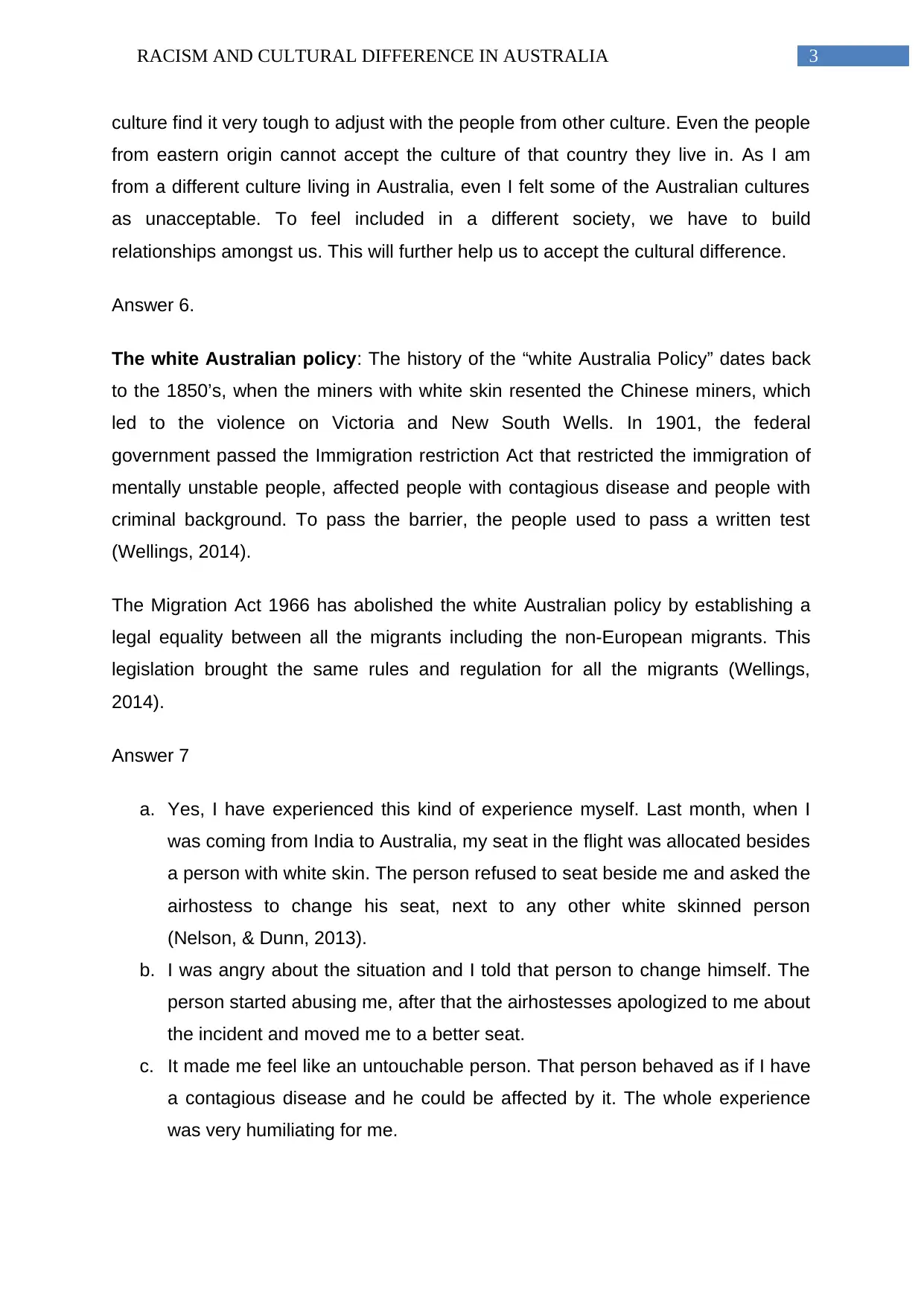
3RACISM AND CULTURAL DIFFERENCE IN AUSTRALIA
culture find it very tough to adjust with the people from other culture. Even the people
from eastern origin cannot accept the culture of that country they live in. As I am
from a different culture living in Australia, even I felt some of the Australian cultures
as unacceptable. To feel included in a different society, we have to build
relationships amongst us. This will further help us to accept the cultural difference.
Answer 6.
The white Australian policy: The history of the “white Australia Policy” dates back
to the 1850’s, when the miners with white skin resented the Chinese miners, which
led to the violence on Victoria and New South Wells. In 1901, the federal
government passed the Immigration restriction Act that restricted the immigration of
mentally unstable people, affected people with contagious disease and people with
criminal background. To pass the barrier, the people used to pass a written test
(Wellings, 2014).
The Migration Act 1966 has abolished the white Australian policy by establishing a
legal equality between all the migrants including the non-European migrants. This
legislation brought the same rules and regulation for all the migrants (Wellings,
2014).
Answer 7
a. Yes, I have experienced this kind of experience myself. Last month, when I
was coming from India to Australia, my seat in the flight was allocated besides
a person with white skin. The person refused to seat beside me and asked the
airhostess to change his seat, next to any other white skinned person
(Nelson, & Dunn, 2013).
b. I was angry about the situation and I told that person to change himself. The
person started abusing me, after that the airhostesses apologized to me about
the incident and moved me to a better seat.
c. It made me feel like an untouchable person. That person behaved as if I have
a contagious disease and he could be affected by it. The whole experience
was very humiliating for me.
culture find it very tough to adjust with the people from other culture. Even the people
from eastern origin cannot accept the culture of that country they live in. As I am
from a different culture living in Australia, even I felt some of the Australian cultures
as unacceptable. To feel included in a different society, we have to build
relationships amongst us. This will further help us to accept the cultural difference.
Answer 6.
The white Australian policy: The history of the “white Australia Policy” dates back
to the 1850’s, when the miners with white skin resented the Chinese miners, which
led to the violence on Victoria and New South Wells. In 1901, the federal
government passed the Immigration restriction Act that restricted the immigration of
mentally unstable people, affected people with contagious disease and people with
criminal background. To pass the barrier, the people used to pass a written test
(Wellings, 2014).
The Migration Act 1966 has abolished the white Australian policy by establishing a
legal equality between all the migrants including the non-European migrants. This
legislation brought the same rules and regulation for all the migrants (Wellings,
2014).
Answer 7
a. Yes, I have experienced this kind of experience myself. Last month, when I
was coming from India to Australia, my seat in the flight was allocated besides
a person with white skin. The person refused to seat beside me and asked the
airhostess to change his seat, next to any other white skinned person
(Nelson, & Dunn, 2013).
b. I was angry about the situation and I told that person to change himself. The
person started abusing me, after that the airhostesses apologized to me about
the incident and moved me to a better seat.
c. It made me feel like an untouchable person. That person behaved as if I have
a contagious disease and he could be affected by it. The whole experience
was very humiliating for me.
Secure Best Marks with AI Grader
Need help grading? Try our AI Grader for instant feedback on your assignments.
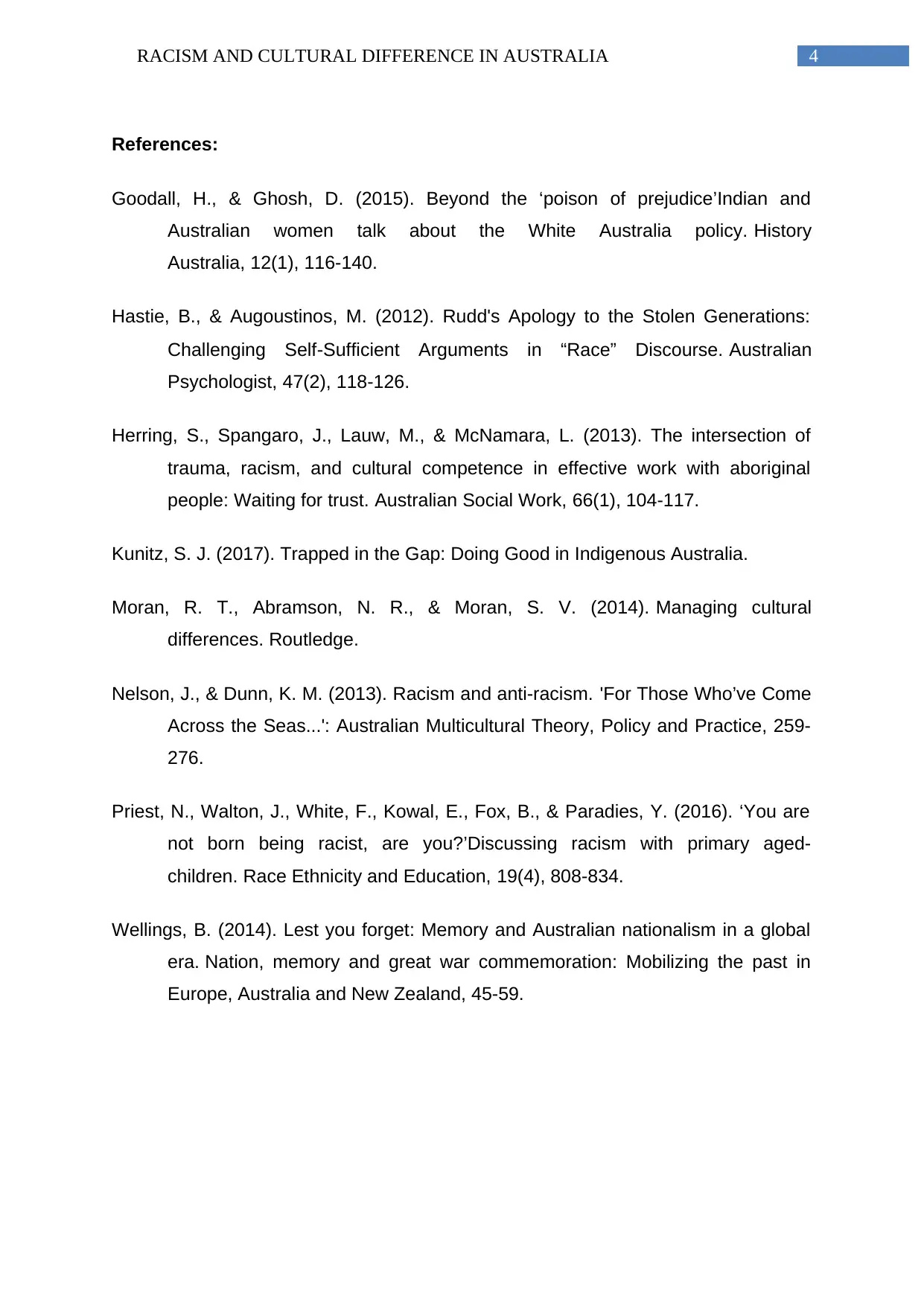
4RACISM AND CULTURAL DIFFERENCE IN AUSTRALIA
References:
Goodall, H., & Ghosh, D. (2015). Beyond the ‘poison of prejudice’Indian and
Australian women talk about the White Australia policy. History
Australia, 12(1), 116-140.
Hastie, B., & Augoustinos, M. (2012). Rudd's Apology to the Stolen Generations:
Challenging Self‐Sufficient Arguments in “Race” Discourse. Australian
Psychologist, 47(2), 118-126.
Herring, S., Spangaro, J., Lauw, M., & McNamara, L. (2013). The intersection of
trauma, racism, and cultural competence in effective work with aboriginal
people: Waiting for trust. Australian Social Work, 66(1), 104-117.
Kunitz, S. J. (2017). Trapped in the Gap: Doing Good in Indigenous Australia.
Moran, R. T., Abramson, N. R., & Moran, S. V. (2014). Managing cultural
differences. Routledge.
Nelson, J., & Dunn, K. M. (2013). Racism and anti-racism. 'For Those Who’ve Come
Across the Seas...': Australian Multicultural Theory, Policy and Practice, 259-
276.
Priest, N., Walton, J., White, F., Kowal, E., Fox, B., & Paradies, Y. (2016). ‘You are
not born being racist, are you?’Discussing racism with primary aged-
children. Race Ethnicity and Education, 19(4), 808-834.
Wellings, B. (2014). Lest you forget: Memory and Australian nationalism in a global
era. Nation, memory and great war commemoration: Mobilizing the past in
Europe, Australia and New Zealand, 45-59.
References:
Goodall, H., & Ghosh, D. (2015). Beyond the ‘poison of prejudice’Indian and
Australian women talk about the White Australia policy. History
Australia, 12(1), 116-140.
Hastie, B., & Augoustinos, M. (2012). Rudd's Apology to the Stolen Generations:
Challenging Self‐Sufficient Arguments in “Race” Discourse. Australian
Psychologist, 47(2), 118-126.
Herring, S., Spangaro, J., Lauw, M., & McNamara, L. (2013). The intersection of
trauma, racism, and cultural competence in effective work with aboriginal
people: Waiting for trust. Australian Social Work, 66(1), 104-117.
Kunitz, S. J. (2017). Trapped in the Gap: Doing Good in Indigenous Australia.
Moran, R. T., Abramson, N. R., & Moran, S. V. (2014). Managing cultural
differences. Routledge.
Nelson, J., & Dunn, K. M. (2013). Racism and anti-racism. 'For Those Who’ve Come
Across the Seas...': Australian Multicultural Theory, Policy and Practice, 259-
276.
Priest, N., Walton, J., White, F., Kowal, E., Fox, B., & Paradies, Y. (2016). ‘You are
not born being racist, are you?’Discussing racism with primary aged-
children. Race Ethnicity and Education, 19(4), 808-834.
Wellings, B. (2014). Lest you forget: Memory and Australian nationalism in a global
era. Nation, memory and great war commemoration: Mobilizing the past in
Europe, Australia and New Zealand, 45-59.
1 out of 5
Related Documents
Your All-in-One AI-Powered Toolkit for Academic Success.
+13062052269
info@desklib.com
Available 24*7 on WhatsApp / Email
![[object Object]](/_next/static/media/star-bottom.7253800d.svg)
Unlock your academic potential
© 2024 | Zucol Services PVT LTD | All rights reserved.





